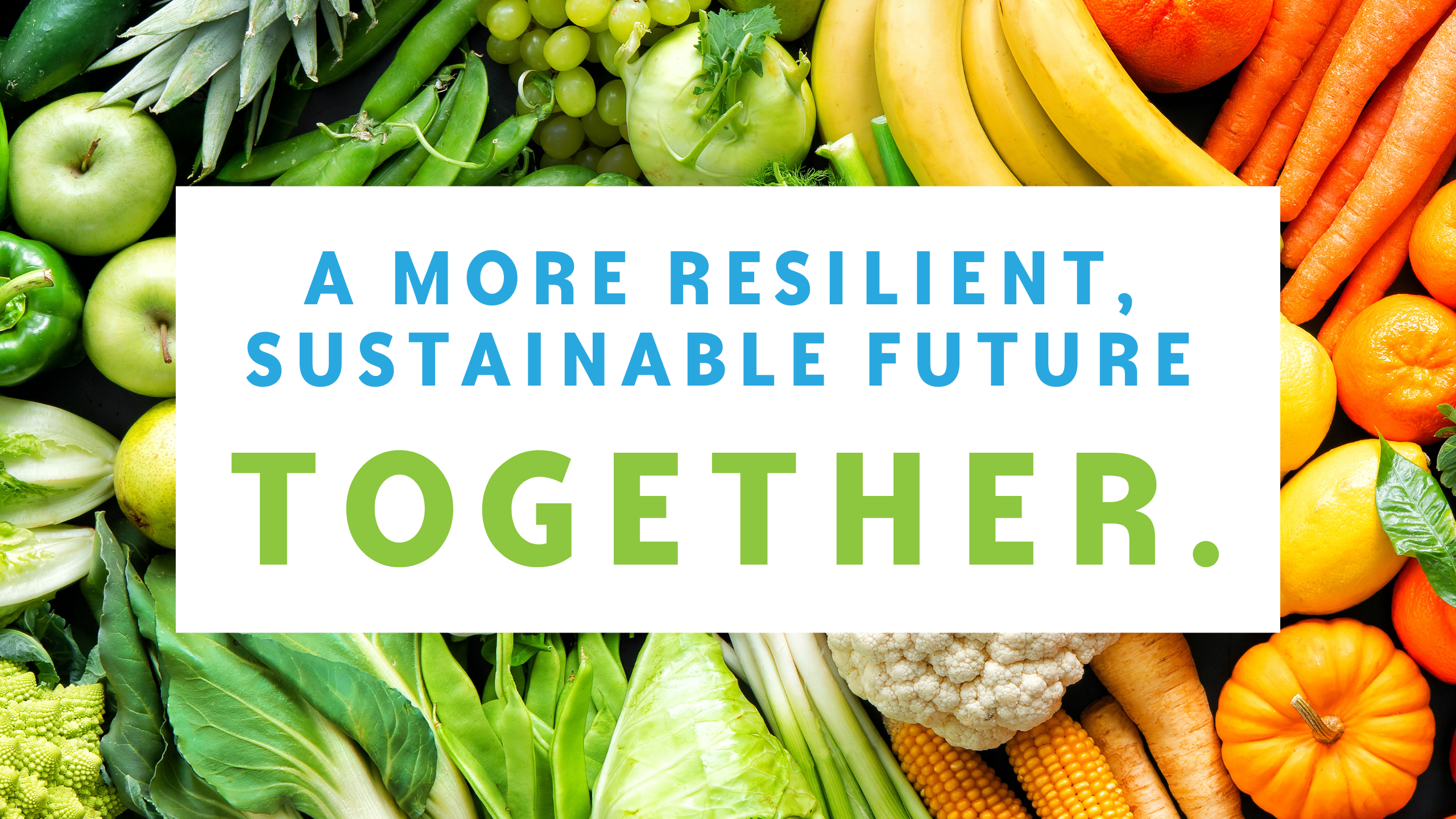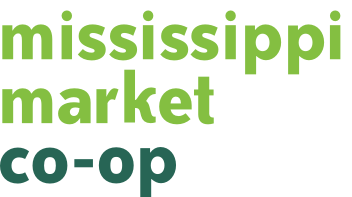
Results: It’s official! Members of Mississippi Market and River Market have voted to unify as Rivers Cooperative Markets beginning in January 2026. Same stores, same staff, same neighborhood focus – now with stronger systems behind the scenes to support our stores, local producers and build a more resilient co-op future.
The newly elected board members are Laura Rosenberg, Andrea Specht and Haley Swails. Congratulations!
Merger Proposal
On behalf of our respective Boards of Directors, Mississippi Market and Stillwater’s River Market are proud to propose a values-aligned, future-focused consolidation. If approved by co-op members this fall, this would enable us to:
- Create stronger sourcing and buying power
- Continue expansion of community programming and partnerships
- Build greater operational resilience and staff investment
For nearly 50 years, Mississippi Market and River Market have independently served the Twin Cities with shared values of local ownership, environmental sustainability, access to organic, high-quality food and cooperation among cooperatives. When every member-owner engages and votes, our co-op communities thrive. For this proposal to move forward, at least two-thirds of the members in each co-op need to approve it.
Board Candidates
Current board members reviewed new candidate qualifications and experiences, resulting in a final slate of five candidates on this year’s election ballot. Co-op members will elect three board members. The board evaluated applicants based on their varying levels of experience and interests in the following areas: Board governance, long-term and strategic planning, leadership or supervisory experience, diversity and inclusivity, creativity and imaginative thinking, and financial experience.

Nathaniel Forbes
CLICK TO READ FULL CANDIDATE APPLICATION
1. Why are you interested in running for this board?
I hope to contribute ideas for advancing the co-op’s mission and, where appropriate, ideas for improving members’ in-store shopping experiences. I’ve been a member for 27 years (and of the Wedge Co-op for 50). Service for 3 years on the Mississippi Market Board is one of few ways I can volunteer to “give back” for my long, happy
experience as a member. As a Board member I want to learn more about ‘behind-the-displays’ decisions that make the co-op’s financial and operational wheels turn. If by learning more I can ask more intelligent questions, and support other Board members to do the same, I plan to do just that.
2. Please describe your experience in one or more of these areas: board governance, long-term and strategic planning, leadership or supervisory experience, diversity and inclusivity, creativity and imaginative thinking, and financial experience.
Governance: I served on the Global Board of the Int’l Association of Emergency Managers (IAEM). I was the trustee for a member of the Cargill family, debating and voting on governance measures taken by a very large company.
Planning: I often say that long-term, strategic planning was my full-time job as founder of the first electronic tax filing company in the 1980s (think: dial-up phone modems), which I sold to Intuit, Inc in 1992. As director of my disaster-management consulting firm for multinational companies (19 years), I was responsible for long-range and operational planning for my company – and for the long-range continuity of the businesses of our clients.
Leadership/Supervisory: I was the supervisor of 50 employees at my first company, and of 10 Singaporean employees at my consulting firm. I am now Manager of a Logistics function in Minnesota & the Dakotas as a volunteer for the American Red Cross (ARC); I am evaluated specifically on my ability lead and coach other
volunteers when I deploy to our disaster response operations.
Financial: I supervised the financials for my two companies (25+ years). That often meant experiencing the pain of making cuts or taking a financial risk of introducing a new service. I didn’t always do so successfully, but I learned how essential it is, experience I hope will benefit the co-op. We are certainly in very challenging competition with other places to buy food.
3. Please describe how you would contribute to the diversity, equity and inclusivity of the board.
I am a 73-year-old retired, Caucasian male member of the co-op who lives near the Selby store. I am willing and happy to serve a term on the Board; however, if there are other Board candidates from diverse backgrounds, I urge co-op members to vote for them instead of me. I strongly support the co-op’s DEI initiatives, and I believe my life history and professional experience provide evidence of my enthusiasm for encouraging and supporting the views of people not like me.
4. In your opinion, what is the role of the co-op in the community?
Its role is to offer healthy food to all Saint Paul residents, and to support local ethical and sustainable growers in the states around us. Those are admirable and ambitious roles. The co-op has a strong record of nurturing the community around us to the best of its ability, and I want to help that continue.

Jon Olson
CLICK TO READ FULL CANDIDATE APPLICATION
1. Why are you interested in running for this board?
Serving on the MM Board is a perfect way for me to serve my community by helping to (1) keep fresh, organic, local food available nearby, (2) keep a thriving business alive, healthy and employing local people, and (3) work cooperatively with people of varied ages and backgrounds who share my interest in sustainable agriculture, fair business practices and plain old good food.
The Mississippi Market is a cornerstone of my community; my wife and I have lived within three blocks of the Selby-Dale store for more than 20 years. It’s the primary reason we stayed in the neighborhood when we moved nine years ago. Co-ops are foundational to a healthy, vibrant community, and I want to help this co-op continue on its successful trajectory.
2. Please describe your experience in one or more of these areas: board governance, long-term and strategic planning, leadership or supervisory experience, diversity and inclusivity, creativity and imaginative thinking, and financial experience.
I’m familiar with the co-op business model and the board functions, having served on the Mississippi Market Board from 2010 to 2015. During those six years as a board member and three years as the board president, I was an integral part of the governance and strategic planning that went into the East 7th store being built and opened. At present, I am on the board having been elected three years ago serving as a board officer and a member of the Recruitment and Diversity, Equity and Inclusion committees.
My leadership experience began in 1986, when, as a student at Southwestern Technical College, I became president of the Minnesota State Technical College Student Association. I’ve since served as a director on boards including the Minnesota Technical College Association for Customized Training, the Minnesota Council for Continuing Education and Customized Training, and numerous program Advisory Councils for Minnesota State college academic programs.
During my tenure in the college system, I used creativity and entrepreneurship skills to lead the research, planning and development of new credit and non-credit programs in Emergency Medical Services, Emergency Management, Industrial Safety and Advanced Manufacturing. Our state college system in Minnesota has been a leader in diversity and equity focus; my every effort along the way has required me to meet standards that support not just racial, gender and cultural equity, career goals for every student.
3. Please describe how you would contribute to the diversity, equity and inclusivity of the board.
By direct involvement during my board service and governance focused to support the diversity, equity and inclusion of the board and the coop community by always using our seven operating principles as our guide: Voluntary and Open Membership, Democratic Member Control, Member Economic Participation, Autonomy and Independence, Education, Training and Information, Cooperation Among Cooperatives and Concern for Community. These practices set an example for all businesses in our community.
4. In your opinion, what is the role of the co-op in the community?
A food co-operative is a locally owned retailer uniquely designed to meet a community’s food needs and benefit its members. In addition to offering a brick-and-mortar shopping experience, food co-ops support farmers and sustainable food sources both locally and at a distance, which allows them to be less dependent on traditional food supply chains. The co-op nourishes the community by creating local jobs and buying locally which keeps commerce and dollars within the community. With shareholders who are member-owners and shoppers, all profits are reinvested in the stores and communities we serve.

Laura Rosenberg
CLICK TO READ FULL CANDIDATE APPLICATION
1. Why are you interested in running for this board?
As a St. Paul resident and Mississippi Market member-owner, I’m deeply committed to the cooperative’s mission of empowering diverse communities through healthy food access and sustainable practices. My interest in board service stems from both personal values alignment and professional experience that directly translates to effective cooperative governance. Having led a comprehensive food insecurity program that serves 500+ students and revealed that 32% experienced food insecurity, I understand firsthand the critical role that accessible, affordable food plays in community well-being. Mississippi Market’s commitment to food justice and community empowerment resonates deeply with my own work addressing systemic barriers to food security.
2. Please describe your experience in one or more of these areas: board governance, long-term and strategic planning, leadership or supervisory experience, diversity and inclusivity, creativity and imaginative thinking, and financial experience.
Creativity & Strategic Thinking: Spearheaded institution-wide Food Insecurity Program from concept through implementation, conducting needs assessment and leading cross-functional team to design sustainable infrastructure including food pantry and referral network serving 500+ students.
Financial Experience: Provide fiduciary oversight for portfolio supporting $1+ million in revenue, conducting monthly financial monitoring and proactively identifying budget variance risks. Experience with budget forecasting, resource development, and securing funding through strategic partnerships with donors and institutional grants.
Leadership & Supervisory Experience: Recruited, hired, and trained 100+ student staff leaders at Santa Clara University. Mentored 10+ team members in current role. Provided individualized goal setting and performance evaluations, creating personalized growth plans that enhanced leadership skills and prepared staff for position success.
Strategic Planning: Co-chaired 15+ departmental committees at Santa Clara University, providing strategic leadership that influenced department-wide initiatives. Currently serve as primary strategic resource for 25+ concurrent project teams, developing comprehensive timelines, project documentation and milestone management aligned with client objectives and goals.
Diversity & Inclusivity: Participated in University of Minnesota’s Racial Justice Training program to better serve BIPOC communities.
3. Please describe how you would contribute to the diversity, equity and inclusivity of the board.
I recognize the privilege inherent in my identities and am committed to leveraging it responsibly by amplifying marginalized voices and ensuring equitable participation. My experience establishing a Whiteness Accountability Group and participating in Racial Justice Training has taught me to examine systems critically. I bring skills in creating accessible programming and facilitating difficult equity conversations while remaining committed to ongoing learning and accountability.
4. In your opinion, what is the role of the co-op in the community?
Mississippi Market is a community anchor embodying democratic values and economic justice. As a member-owned cooperative, it keeps profits local while providing accessible, healthy food options. The co-op extends beyond commerce to education, modeling sustainable practices and creating space for community connection. It demonstrates that business can prioritize people and planet alongside profit. By operating under cooperative principles, Mississippi Market shows how democratic member control drives decisions serving community needs rather than distant shareholders. Most importantly, it addresses food justice by ensuring diverse communities have access to quality, affordable food while supporting local producers.

Andrea Specht
CLICK TO READ FULL CANDIDATE APPLICATION
1. Why are you interested in running for this board?
For more than a decade, I’ve bought 90% of our household’s food from Mississippi Market. I rely on our co-op as a trusted source for fresh, local, and sustainably produced products, and it’s important to me to see Mississippi Market continue thriving for the good of our diverse community. I would value the opportunity to contribute relevant skills and experience as a board member while deepening my understanding of how the seven international cooperative principles infuse Mississippi Market’s governance and operations.
2. Please describe your experience in one or more of these areas: board governance, long-term and strategic planning, leadership or supervisory experience, diversity and inclusivity, creativity and imaginative thinking, and financial experience.
My professional and personal background includes more than 25 years’ experience leading, governing, and managing nonprofit organizations to increase their impact in fields ranging from youth development to civic engagement, higher education, and arts and culture. I am also a licensed attorney.
My board governance experience ranges from serving as the board president for St. Paul’s West Side Community Organization (WSCO) more than a couple decades ago to being an at-large board member and chairing various board committees for the Girl Scout Council of Minnesota and Wisconsin River Valleys, Minnesota Citizens for the Arts, the Bloomington Regional Chamber of Commerce and Bloomington Rotary Club, and other organizations.
I have worked as a nonprofit executive director since 2009 and have been honored to serve in that role for three organizations. Overseeing long-term and strategic planning, and facilitating progress in diversity and inclusivity have been critical responsibilities in all three organizations, along with big picture and often day-to-day work in revenue development and finance; human resources; marketing, communications, and audience development; partnerships development; and program design and delivery.
As a former practicing visual artist and a lifelong arts appreciator, I find that every day presents opportunities to apply right- and left-brain thinking in finding creative, imaginative paths forward.
3. Please describe how you would contribute to the diversity, equity and inclusivity of the board.
As best I know, no personally significant element of my identity is underrepresented or marginalized within the coop or its board. With that in mind, I would work to demonstrate humility, thoughtful curiosity, and awareness of the forms of privilege I’ve benefited from as I collaborate with other board members to ensure that Mississippi Market welcomes, serves, and engages members and customers who reflect the full diversity of our community.
4. In your opinion, what is the role of the co-op in the community?
I believe our co-op’s role is to foster, champion, and increase our community’s access to healthy, regeneratively and humanely produced, and whenever possible, locally grown food. And to do so in a way that embodies the seven internationally recognized principles of co-operatives. In fulfilling this role, Mississippi Market is a critical part of the civic infrastructure our community needs to become more resilient, resourceful, peaceful, and just.

Haley Swails
CLICK TO READ FULL CANDIDATE APPLICATION
1. Why are you interested in running for this board?
My personal values closely align with those of Mississippi Market Co-op, especially its commitment to sustainability, equity, and community health. I’m passionate about having access to locally sourced, sustainable food and supporting systems that make that possible for everyone. As someone who deeply cares about the wellbeing of both people and the planet, I see the co-op as a vital part of the community I love, and I’m excited about the opportunity to help shape its future through board service.
2. Please describe your experience in one or more of these areas: board governance, long-term and strategic planning, leadership or supervisory experience, diversity and inclusivity, creativity and imaginative thinking, and financial experience.
I bring several years of leadership and community-focused experience to the table. I currently serve as the General Manager at my workplace, a role I’ve held for over a year. Prior to that, I was the General Manager at a local coffee shop, where I gained valuable experience leading a team, managing operations, and supporting local partnerships. Both roles have deepened my skills in staff supervision, daily operations, long-term planning, and making decisions that balance business needs with human-centered values. In my current position, I focus heavily on cultivating an inclusive, welcoming environment where staff and customers alike feel valued and connected. This work has reinforced my belief in the power of community spaces and aligns closely with the co-op’s mission of accessibility, sustainability, and shared ownership.
3. Please describe how you would contribute to the diversity, equity and inclusivity of the board.
As a transgender person of color, I bring a deep understanding of the need for real, practiced inclusion. In my leadership role, I’ve implemented gender neutral locker rooms and emphasized the use of preferred pronouns, creating safer spaces for LGBTQIA+ individuals in environments that were not historically inclusive. I would bring this perspective to the board with humility, purpose, and a strong commitment to advancing equity and belonging.
4. In your opinion, what is the role of the co-op in the community?
I believe the co-op plays a vital role in bridging the gap between farm and table, helping to create a more transparent, equitable, and sustainable food system. By supporting local farmers and producers, it strengthens our regional economy and promotes environmental responsibility. Just as importantly, the co-op ensures that
nourishing, sustainable food is accessible to more people, treating it as a right rather than a luxury. It also serves as a community hub for education, helping people make informed choices about their health and the impact of what they eat on both their bodies and the planet.

